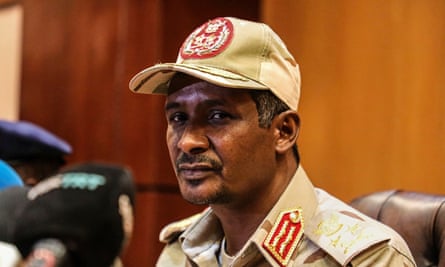
The UN secretary general, António Guterres, is “gravely alarmed” at reports of a full-scale assault on the Sudanese city of al-Fashir by the paramilitary Rapid Support Forces and has called on its leader to halt the attack immediately, according to Guterres’ spokesperson.
“It is unconscionable that the warring parties have repeatedly ignored calls for a cessation of hostilities,” Stéphane Dujarric said in a statement.
In a sign that the crisis is belatedly rising up the diplomatic agenda at the UN general assembly in New York, similar fears were expressed by Josep Borrell, the EU foreign affairs chief, who said the 27-member bloc would not bear witness to another genocide.
“Belligerent parties, their affiliated militias and their regional supporters must adhere to international humanitarian law, by protecting civilians from conflict, provide unhindered humanitarian access and allow civilians to move in and out of Zamzam camp,” said Borrell, referring to the camp for internally displaced people in North Darfur, the region of which al-Fashir is capital.
The assault by the RSF in North Darfur comes amid fresh evidence that RSF is being armed by the United Arab Emirates. The attack also threatens to derail an economic cooperation summit between Joe Biden and his UAE counterpart, Mohammed bin Zayed Al Nahyan, at the White House on Monday. The meeting had previously been billed as the culmination of efforts to restore relations between the two countries.
In advance of the meeting, however, US national security officials leaked details, which were published in the New York Times, claiming the UEA was playing “a double game” by using airbases in neighbouring Chad not only to fly in aid but also to launch drones that passed on battlefield information and to escort weapons shipments to the RSF.
The UAE denies it is providing weapons or any other form of support to the RSF, which is accused of numerous war crimes and evolved from the Janjaweed militias. Lana Nusseibeh, the country’s assistant minister for political affairs, recently wrote in a letter to the Economist magazine: “The UAE is not providing weapons or any other support to the Rapid Support Forces or any of the warring parties in Sudan. We believe that the only way to achieve peace is through effective diplomacy where the warring parties must reach a full nationwide ceasefire.”

The growing diplomatic attention is belated for a war that has displaced 10 million people and left as many as 25 million, half the population, facing acute hunger. There is a recognition that the issue has been neglected by top diplomats as they have focused on Gaza and Ukraine.
The UN imposed an arms embargo on Sudan two decades ago, but it has been widely flouted by both sides.
The UAE insists it has “played a constructive role” in helping to establish a mediation format it says has “unlocked critical routes for aid deliveries, secured further commitments to protect civilians and developed a proposal for a compliance mechanism to ensure implementation of the Jeddah declaration, with the objective to secure a ceasefire”.
In his statement on Saturday, Guterres called on the head of the RSF, Lt Gen Mohamed Hamdan “Hemedti” Dagalo, to “act responsibly and immediately order a halt to the RSF attack”.
 Print
Print


